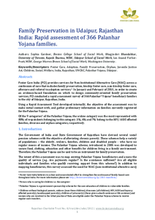Abstract
Foster Care India (FCI) provides services for Non-Institutional Alternative Care (NIAC) across a continuum of care that includes family preservation, kinship foster care, non-kinship foster care, aftercare and referral to adoption services. In January and February of 2015, in order to create an evidence-based foundation on which to design community-oriented family preservation services, FCI conducted a rapid assessment survey of 366 Palanhar Yojana beneficiary families in the city of Udaipur, Rajasthan, India. Using a Rapid Assessment Tool developed internally, the objective of the assessment was to make initial contact with, and gather preliminary information on families currently registered for the Palanhar Yojana. Of the 9 categories of the Palanhar Yojana, the widow category was the most represented with 80% of respondents belonging to this category. 5%, 6% and 7% belong to the HIV/AIDS-affected families, divorcee and orphan categories, respectively.

